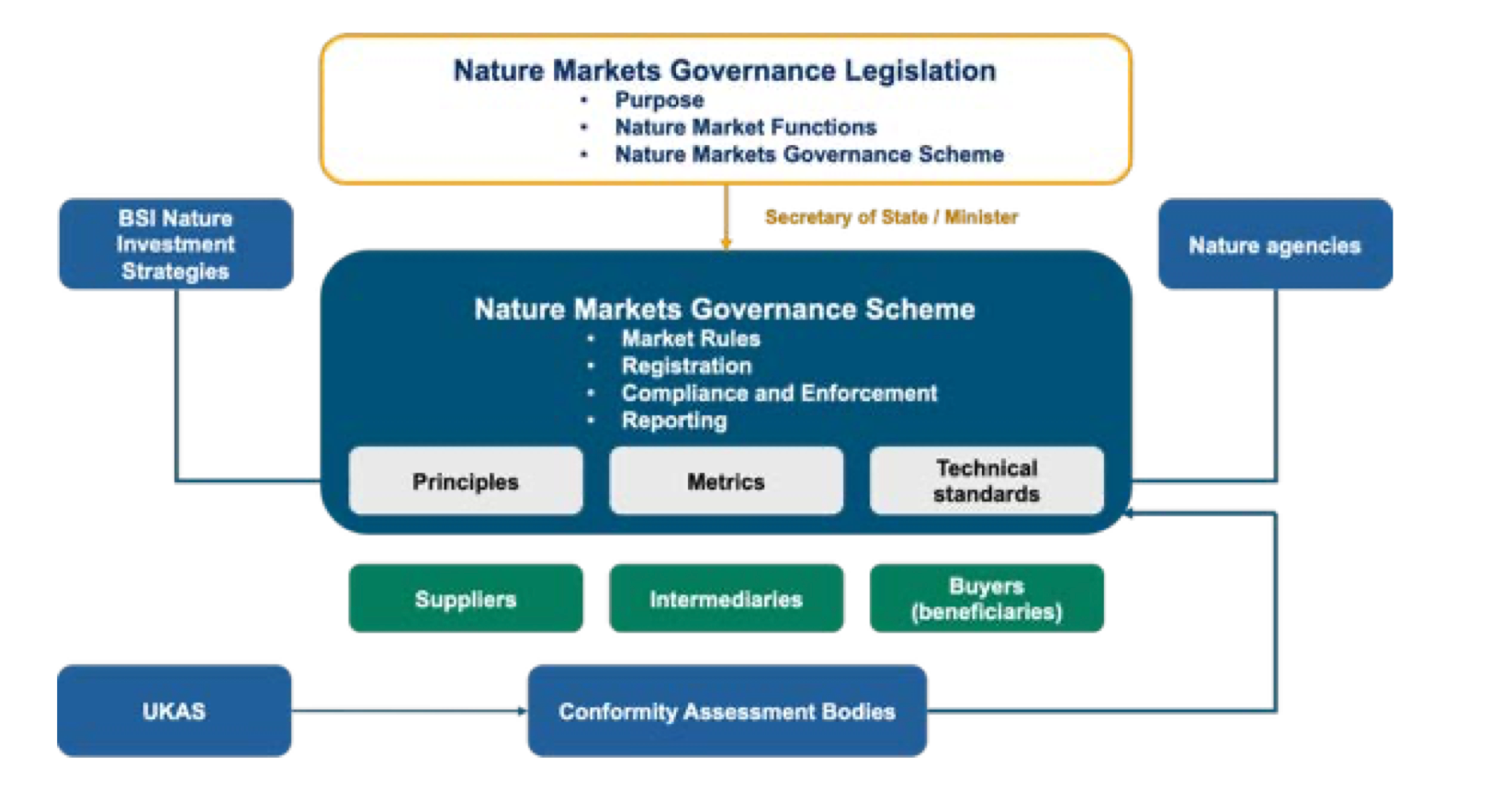The Proposed UK Nature Markets Governance Scheme would include:
- defining a nature market and its purpose
- establishing the core obligation of registration of nature market participants
- specifying the market functions that give rise to the obligation to register as a market participant
- setting out the objectives of a Scheme
- enabling the Secretary of State/Minister to approve a Scheme including its market rules,
- principles, standards, metrics and fees.
- providing for the Secretary of State/Minister to make regulations regarding the establishment, approval, operation and review of the Scheme.
The following drafting illustrates how the Framework could be incorporated into appropriate UK and/or devolved administration legislation.
Read the full Key Findings and Proposal

1 Nature markets
Nature markets are market mechanisms designed to align economic incentives with nature recovery, by establishing price signals for the benefits delivered by nature to help achieve statutory or voluntary targets for environmental improvement.
2 Purpose of a nature market
The purpose of a nature market is:
(1) to enable the goods and services delivered by nature to be paid for by those who benefit from them directly and indirectly
(2) to create revenue streams from the supply and sale of biodiversity and ecosystem services to fund investment in nature recovery
(3) to deliver nature-based projects and activities in places that deliver the greatest benefit for the lowest cost.
3 Core obligation of nature market participants
Any person carrying out a nature market function must be a member of a nature market governance scheme approved by the Secretary of State/Minister.
4 Nature Market Functions
For the purposes of section 3, nature market functions are -
(1) the design and delivery of nature-based projects or activities for the supply or sale of the benefits generated
(2) the certification of nature-based projects or activities to approved technical standards
(3) the application of approved metrics to quantify the improvements in biodiversity and ecosystem services delivered by nature-based projects or activities
(4) the registration of the benefits delivered
(5) the issue, supply and/or sale of credits for one or more of the benefits
(6) the monitoring of project compliance and performance
(7) auditing and enforcing compliance of nature market participants with market rules
5 Objectives of Nature Market Governance Scheme
For the purposes of Section 3, a nature market governance scheme9 must be run by a not-for profit legal entity established to provide expert independent oversight of the integrity of nature markets, with the objectives of:
(1) developing and maintaining market rules that give practical effect to recognised principles for high integrity environmental markets
(2) providing a mechanism for the review and approval of:
(a) metrics for quantifying the biodiversity and ecosystem services delivered by nature-based projects and activities
(b) monitoring plans for the verification of the benefits being delivered
(3) developing and implementing a compliance and enforcement policy for member compliance with market rules periodic reporting to government on the state of UK nature markets, including their transparency, efficiency and fairness
(4) establishing and maintaining market balancing and exit arrangements.
6. Content of Market Rules
For the purposes of Section 5 (1) market rules must include rules governing:
(1) the integrity principles to apply to all nature market participants
(2) market participant registration, including the nature market functions authorised
(3) project registration and certification including relevant technical standards to apply to nature-based projects or activities
(4) benefit quantification including the process to review and approve metrics to apply to the calculation of the benefits traded
(5) how the rights to biodiversity and ecosystem services generated by a project or activity are established, retained and/or traded, including the use of nature credits
(6) the status of nature credits including the type(s) of credits that can and cannot be created from a single project or activity
(7) stacking including project stacking and benefit stacking
(8) tests for additionality and how they apply to different types of projects or activities
(9) registry requirements including process for project monitoring and benefit tracking and tracing
(10) market balancing to address scientific uncertainty and the risk of project failure and minimise the risk that the quantity of biodiversity and ecosystem services traded exceeds the improvements in biodiversity and ecosystem services delivered
(11) compliance auditing, including the use of accredited Conformity Assessment Bodies
(12) enforcement, including the process and sanctions for non-compliance of registered market participants
(13) market exit arrangements, including provisions for meeting obligations and liabilities in the event of planned and unplanned exit of a market participant
7. Development and approval of Scheme
(1) The development of a nature market governance scheme must involve public consultation on a draft scheme including its proposed:
(a) legal form and governance
(b) operating model
(c) resourcing
(2) The Secretary of State/Minister may approve a nature market governance scheme if the Secretary of State/Minister considers that:
(a) the scheme meets the requirements of Section 5
(b) the market rules for the scheme comply with Section 6
(c) the scheme has the structure, form and resources needed to meet its objectives.
(3) In considering whether to approve a scheme under Section 7 (2), the Secretary of State/Minister must have regard to the public consultation on the draft scheme, and the response to the consultation.
8. Monitoring and Review of Scheme
(1) The Secretary of State/Minister must:
(a) monitor the performance of the scheme
(b) carry out a review of the scheme within five years of its establishment.
(2) If the Secretary of State/Minister concludes following a review carried out under Section 8(1)(b) that the scheme no longer meets the requirements of Section 7 (2), the Minister may revoke the scheme’s approval.
